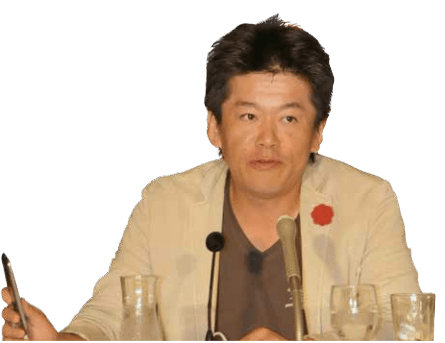Issue:
THE FORMER BUSINESS BAD-BOY HAS SOME UNUSUAL ANSWERS TO JAPAN’S PROBLEMS
Takafumi Horie:
Still angry after all these years
by David McNeill
Older, thinner, but with his ability to deliver a peppery bon mot still intact, paroled entrepreneur Takafumi Horie was back at the FCCJ on June 5, criticizing “lazy” Japanese management and predicting the demise of the nation state.
Playing to his core constituency of young Japanese males, “Horiemon” defended controversial Osaka Mayor Toru Hashimoto, warned about Japan’s drift into economic oblivion and even voiced his idiosyncratic theory that development makes women better looking.
“I was in Singapore and I noticed the women had grown much more beautiful,” he told his FCCJ audience, to titters. “I used to not consider the women so highly, but as the economy improves women seem to get better looking, too.”
Now a middle aged man, the former business bad boy admitted that since his arrest in 2006 for falsifying the financial reports of Livedoor, the internet firm he founded, he has lost 99 percent of his wealth. Horie served 21 months of a 30-month sentence before being paroled in March.
But ever the optimist, he pledged to rebuild on what’s left his so called “intangible” assets: trust and confidence. He said the explosive growth of social media during his time in prison had stimulated entrepreneurship and would make it easier for him to “monetize” these assets.
“For example, I almost have one million Twitter followers,” he explained, adding that the rise of online video services such as YouTube and www.nicovideo.jp means “anything” is now possible. Recalling his doomed attempt to take over Fuji TV in 2005, he said, “What was done then as a corporation could now be done by me as an individual.” “anything” is now possible. Recalling his doomed attempt to take over Fuji TV in 2005, he said, “What was done then as a corporation could now be done by me as an individual.”

“If you consider my one million followers in terms of ratings, that’s about one percent [of Japan’s TV audience],” he said. “If around 10 people with the same amount of followers as myself were to come together that would be about 10 percent. We could do the same things as a traditional television station.”
Horie says he warned Fuji TV executives during his attempted hostile take over that this internet tsunami was on its way, but they didn’t listen. “Now followers are coming to individuals such as me instead of corporations.”
To his critics, Horie is a reckless and unprincipled carpetbagger who picked at the wounds of Japan’s post bubble economy and was punished accordingly. His Teflon confidence and apparent lack of contrition will do nothing to convince them otherwise.
His supporters say he was choked by the establishment for trying to challenge Japan Inc; in his introduction, FCCJ president Georges Baumgartner praised Horie, saying his down fall had “discouraged a generation of young Japanese” from trying out a career in business.
Horie himself, however, seemed anything but discouraged. Nor did he refrain from dispensing advice to would be entrepreneurs, sounding forth on the need to slash corporate taxes, shake up Japanese management and even scrap licensing systems for lawyers and medical practitioners. “I believe that rather than thinking of how to achieve growth we have to think about how to shrink the size of government and regulations.”
Horie even questioned the need for armies to defend Japan, saying the internet is destroying borders. “As examples of high technology, I like fighter planes. But I don’t think they’re useful at all. I believe that war has until now functioned as a driver for technological development [but] is no longer needed for that purpose.
“I think the whole concept of the nation state is on the verge of collapse,” he continued, “and we need to eliminate as much government interference as possible.” Without this change, he warned, Japan would continue to slide, relative to faster moving business competitors like Singapore.
“I really feel this is a serious issue Japan is being drained of talented human resources, with Japanese business managers slow to catch up with global trends. Those remaining within the system in Japan are those less talented,” he said, adding that the country needs policies “to attract skilled and talented” immigrants.
Was that a hint that he would have another stab at political office? (In his last visit to the FCCJ seven years ago, Horie pledged to become prime minister.) No, he insisted, but he did have a tip for the country’s top political job. Toru Hashimoto, he said, would “alter the status quo” of politics.
“If there is somebody who can do my job, I’d be happy to let that person take over. And now this somebody has finally appeared. It’s Hashimoto,” he said.
The Osaka mayor, who also leads the Japan Restoration Party, has dug himself what many believe is a political grave by saying that Japan’s wartime “comfort women” system of sexual slavery was necessary to “maintain military discipline.” Hashimoto defended those comments at the FCCJ in May.
Horie said someone planning to be a career politician would not make such comments. “I think Hashimoto believes he is ready to quit politics anytime. And unless we have more people like that, we don’t have any chance of reducing the scale of government. And if the government stays the size it is today we will not have any chance to make the country I hope for.”

